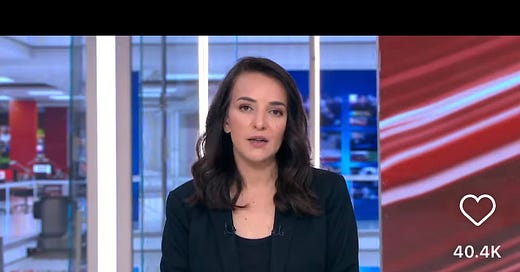Even in the midst of heartache and destruction, culture keeps moving. In Israel, despite the violent attacks by Hamas in the Gaza perimeter and Israel’s military response that has placed Gaza under siege, despite the endless funerals and pleas for the return of hostages, despite the sorrow so many families feel over the loss of loved ones, despite the fear and anxiety over the war and its outcome, we’ve seen so many expressions of humanity online, in the form of celebrity activism, social messaging, and even humor. As a respite from the horror of news reports and fear for the future, we wanted to offer some of the highlights of what we’ve seen on social media and Israeli news recently.
A brief disclaimer: we know that in addition to the items we report on here, there have been a lot of horrible images, videos, and memes circulating on social media and popular culture. Obviously, we pick and choose what we discuss, and our choices here simply reflect what we felt was most compelling and provided the best insights into Israeli celebrity and cultural responses to the Hamas attacks and the ensuing war in Gaza. Also, the creativity of silly people on the internet is basically the only thing keeping us going right now. But emotions are high and the atmosphere is tense, online as well as in real life, and if what we’ve chosen to cover here doesn’t speak to you in the moment, we understand and hope you’ll come back to read the newsletter when it's right for you.
We won't offer political analysis of how to end these horrors in Israel and Palestine. There are a million other places on the internet you can go for more on what's happening and what the solutions might be. We are interested in the culture that keeps people going in the darkest of times, and we hope you are too.
Celebrities Gonna Celebrity
Only days after the October 7 attacks, we began to see videos of Israeli celebrities - singers, actors, and comedians - visiting both the evacuees from southern Israel, many of whom are now living in hotels in Eilat and the Dead Sea area, as well as injured Israeli soldiers and civilians. Unlike members of the current government who have tried to visit the injured and been shouted out of hospitals, these celebrities are warmly welcomed and appear to offer some measure of solace to displaced and traumatized citizens. Some of our favorite singers, including Static (with his girlfriend, Rona-lee Shimon, a well-known actress in her own right), Stephane Legar, and Neta Barzilai, former winner of the Eurovision Song Contest, who recently canceled her tour due to events in Israel; personalities like Nelly Tagar, a comedian, actress, and podcast host; the comedian Guri Alfi; and sometime frenemy of the newsletter Omer Adam have been performing concerts for the displaced, singing and visiting with the injured, and raising money for destroyed communities as well as supplies for the military and displaced citizens. Israelis really love communal singing, and it seems like the country is one giant kumsitz right now.
One significant subset of this group of celebrity responses is those of prominent Arab-Israeli personalities. The news anchor Lucy Aharish, who is married to Fauda star Tsahi Halevy, recorded an impassioned message in English at the beginning of her show on October 10, in which she angrily recounted the horrific massacres committed by Hamas and conveyed her sense of the unity of Israeli society, despite its internal differences. Her message was later picked up by CNN, which interviewed her about her unique position as a Muslim Arab woman speaking on behalf of Israeli society.

Another prominent Arab-Israeli celebrity, the singer and actress Valerie Hamaty, posted video of herself on Instagram entertaining the wounded at the hospital (she has also entertained evacuees) with a moving message about Arabic. On October 11, she wrote, “I sang in both Hebrew and Arabic, my two mother tongues. As I always say, Arabic is so beautiful. I know that, much to my sorrow, it also serves as the language of the enemy. But it’s so much more than that. It’s full of layers, culture, and depth. It’s the language of half of this country. Of every native of an Arab nation who lives here [note: it’s clear that she’s referring also to Mizrahi Jews with Arab heritage]. Who serve the state. Who love this country. Who would give their lives for it. Remember this also in these moments that are so, so difficult.”
Neither Lucy nor Valerie has made any explicit mention of Palestine or Palestinians, but have focused their messaging on cultural and social belonging, which in itself takes on political overtones at a moment when Arab citizens of Israel are being policed for old social media posts. While these two women probably don’t represent the mainstream of Arab Israeli citizens, their public messages consistently claim space for their community as an integral part of Israeli society and work to make the contributions of Arab Israelis visible, even or especially in moments of crisis and tension.
Eating Our Feelings
This period of extreme anxiety and tension within Israel has also spawned a new genre of emotional eating videos, led by the content creator and podcast host Etai Ben Simchon, who we think started the trend with a catalogue of all the weird and slightly disgusting foods he’d been eating under stress. He followed it up with a masterpiece “recipe” video chronicling his easy dinner idea: a bowl of broken up pieces of a chocolate bar mixed with a bag of Bamba. After putting it all together and giving it a shake, he says, “Then wait one or two seconds so that you can feel that you have a drop of human dignity,” before eating. Etai, we salute you. He also has a great podcast about Britney Spears’ podcast impeccably titled “Brit haHadasha.”
Another of these emotional eating videos makes use of the audio from Joe Biden’s first speech about the Hamas attacks, a speech that Israelis absolutely went bonkers over (if Biden could run for president in Israel, he’d be a shoo-in!). Biden, looking straight at the camera, warned neighboring countries not to take advantage of the chaos with a definitive “don’t” that the sports and fitness instructor Shani Blatt turned into a warning against eating all kinds of unhealthy foods out of stress. Each time she grabs something she shouldn’t be eating, Joe Biden intones “DON’T” in the background. No disrespect Shani, but honestly, eat the snacks now. No one cares. We don’t foodshame here!
Even the comedy sketch show Eretz Nehederet (the Israeli SNL) got in on the trend. It's official! Emotional eating is cool now. Along with mustaches apparently.
The Matriarch Rachel
In the days after the Hamas attacks, one story stood out among the reports of horrific violence, destruction, and death: the story of a grandmother in Ofakim who had saved herself and her husband by feeding her Hamas captors until help could arrive. Rachel Edri, who has become a folk hero in Israel, is the daughter of parents who immigrated from Iran and has worked her whole life in the canteen of a local army base. When terrorists entered her home on October 7, she plied them with food and drink, she later said partly to bribe them to keep her family alive but partly because it was simply in her nature to entertain guests. She spent 17 hours talking to and feeding the men until Israeli forces killed them in a shootout and freed her and her husband. Her simple and natural response to this extreme situation has been hailed in Israel and abroad as heroic, and not only did she get to hug President Biden when he visited, but she has also become the subject of a wide variety of funny and morale-boosting memes, as well as an Eretz Nehederet sketch.


Nothing’s Too Sad to Joke About
The Jewish people have a long history of making jokes about sorrow, and the events of October 7 are no exception. Just a few days after the attacks, the comedian Ido Katzir posted audio of some joke WhatsApp messages meant to parody the type of hysterical misinformation that circulates around Israeli WhatsApp groups during crises. Katzir’s messages included silly warnings from people who claim they’ve just spoken to someone who knows someone important in the Israeli government who has warned them they need to take certain precautions, except in this case the precautions are that if you’ve left any cottage cheese, milk, or eggs outside the fridge, “That belongs to Hamas, that’s the cottage cheese of Hamas.” Hey, everyone loves Israeli cottage!
Another hilarious one from the comedian Shirli Levi notes that everyone she knows except her has been called up for reserve military service and compares it to being chosen last in PE class. After detailing all the sacrifices her friends have to make - not being able to shower, having to wear a uniform all the time, being away from home - she recalls calling a friend to see how she’s doing and seeing a whole group of extremely hot guys behind her, asking, “Tell me, is this reserve duty, or ‘Love Me,’” finally ending with “Please call me up right now!” We get it - dating is tough! Meanwhile in the matchmaking realm, everyone and their mom is on the case, whether you're ex-politician Naftali Bennett or social media star Maya Wertheimer.
War on Television
After a few weeks of dedicated war programming, there's some signs that regular programs are starting to come back including The Next Star, which will choose Israel's next representative to Eurovision. We'll be watching this one.
Eretz Nehederet also did a special war episode. While we were mixed on the actual sketches, it reminded us of dark humor of wars past.
Therefore, we conclude with two classic Eretz Nehederet sketches from the early 2000s that we can't stop thinking about :
Hasbara, Israeli official government PR, is...often cringe inducing, to put it mildly. And we’ve seen a lot of hasbara, for better or worse, in the last few weeks. Even on the heels of 2006, it was ripe for parody. This video is a perfect send up of that kind of discourse and is sadly still relevant, minus the part about Leo dating Bar Rafaeli.
As we mentioned, if you're anyone in the Israeli cultural scene right now, you're performing for soldiers or hospital patients or internally displaced families. And perhaps more than anyone, David Broza is there. He's singing with random soldiers. He's singing with Haredi superstar Avraham Fried on an airplane. And every time we see him, we can't stop thinking of this incredible clip from 2006 where David Broza will not stop singing. As for what happens, we'll will just say that Eretz Nehederet argues that there are some things worse than rockets.
Finally, some good news…
Despite some earlier reports to the contrary, Aviv Alush is still making his etrog jam! And making official government-funded hasbara spots to inspire the country. Some things remain constant even in these times.






